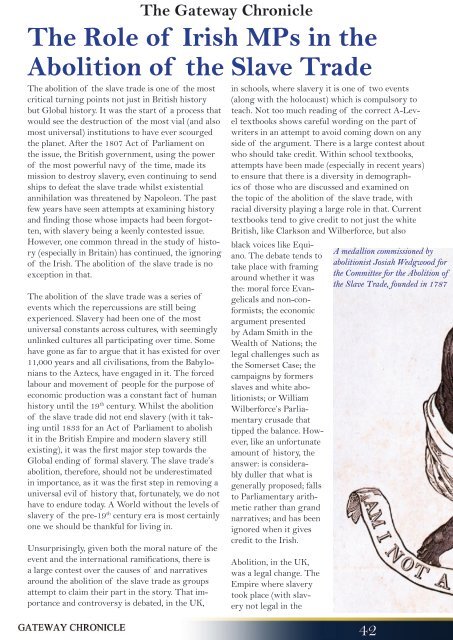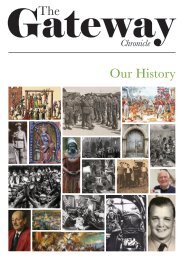You also want an ePaper? Increase the reach of your titles
YUMPU automatically turns print PDFs into web optimized ePapers that Google loves.
The <strong>Gateway</strong> <strong>Chronicle</strong><br />
The Role of Irish MPs in the<br />
Abolition of the Slave Trade<br />
The abolition of the slave trade is one of the most<br />
critical turning points not just in British history<br />
but Global history. It was the start of a process that<br />
would see the destruction of the most vial (and also<br />
most universal) institutions to have ever scourged<br />
the planet. After the 1807 Act of Parliament on<br />
the issue, the British government, using the power<br />
of the most powerful navy of the time, made its<br />
mission to destroy slavery, even continuing to send<br />
ships to defeat the slave trade whilst existential<br />
annihilation was threatened by Napoleon. The past<br />
few years have seen attempts at examining history<br />
and finding those whose impacts had been forgotten,<br />
with slavery being a keenly contested issue.<br />
However, one common thread in the study of history<br />
(especially in Britain) has continued, the ignoring<br />
of the Irish. The abolition of the slave trade is no<br />
exception in that.<br />
The abolition of the slave trade was a series of<br />
events which the repercussions are still being<br />
experienced. Slavery had been one of the most<br />
universal constants across cultures, with seemingly<br />
unlinked cultures all participating over time. Some<br />
have gone as far to argue that it has existed for over<br />
11,000 years and all civilisations, from the Babylonians<br />
to the Aztecs, have engaged in it. The forced<br />
labour and movement of people for the purpose of<br />
economic production was a constant fact of human<br />
history until the 19 th century. Whilst the abolition<br />
of the slave trade did not end slavery (with it taking<br />
until 1833 for an Act of Parliament to abolish<br />
it in the British Empire and modern slavery still<br />
existing), it was the first major step towards the<br />
Global ending of formal slavery. The slave trade’s<br />
abolition, therefore, should not be underestimated<br />
in importance, as it was the first step in removing a<br />
universal evil of history that, fortunately, we do not<br />
have to endure today. A World without the levels of<br />
slavery of the pre-19 th century era is most certainly<br />
one we should be thankful for living in.<br />
Unsurprisingly, given both the moral nature of the<br />
event and the international ramifications, there is<br />
a large contest over the causes of and narratives<br />
around the abolition of the slave trade as groups<br />
attempt to claim their part in the story. That importance<br />
and controversy is debated, in the UK,<br />
in schools, where slavery it is one of two events<br />
(along with the holocaust) which is compulsory to<br />
teach. Not too much reading of the correct A-Level<br />
textbooks shows careful wording on the part of<br />
writers in an attempt to avoid coming down on any<br />
side of the argument. There is a large contest about<br />
who should take credit. Within school textbooks,<br />
attempts have been made (especially in recent years)<br />
to ensure that there is a diversity in demographics<br />
of those who are discussed and examined on<br />
the topic of the abolition of the slave trade, with<br />
racial diversity playing a large role in that. Current<br />
textbooks tend to give credit to not just the white<br />
British, like Clarkson and Wilberforce, but also<br />
black voices like Equiano.<br />
The debate tends to<br />
take place with framing<br />
around whether it was<br />
the: moral force Evangelicals<br />
and non-conformists;<br />
the economic<br />
argument presented<br />
by Adam Smith in the<br />
Wealth of Nations; the<br />
legal challenges such as<br />
the Somerset Case; the<br />
campaigns by formers<br />
slaves and white abolitionists;<br />
or William<br />
Wilberforce’s Parliamentary<br />
crusade that<br />
tipped the balance. However,<br />
like an unfortunate<br />
amount of history, the<br />
answer: is considerably<br />
duller that what is<br />
generally proposed; falls<br />
to Parliamentary arithmetic<br />
rather than grand<br />
narratives; and has been<br />
ignored when it gives<br />
credit to the Irish.<br />
Abolition, in the UK,<br />
was a legal change. The<br />
Empire where slavery<br />
took place (with slavery<br />
not legal in the<br />
A medallion commissioned by<br />
abolitionist Josiah Wedgwood for<br />
the Committee for the Abolition of<br />
the Slave Trade, founded in 1787<br />
42


















